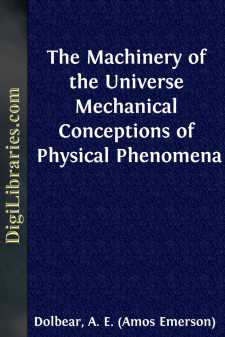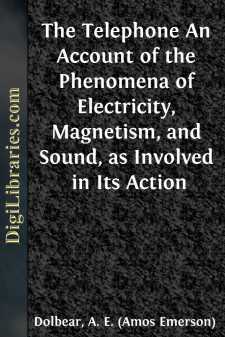Categories
- Antiques & Collectibles 13
- Architecture 36
- Art 48
- Bibles 22
- Biography & Autobiography 813
- Body, Mind & Spirit 142
- Business & Economics 28
- Children's Books 17
- Children's Fiction 14
- Computers 4
- Cooking 94
- Crafts & Hobbies 4
- Drama 346
- Education 46
- Family & Relationships 57
- Fiction 11829
- Games 19
- Gardening 17
- Health & Fitness 34
- History 1377
- House & Home 1
- Humor 147
- Juvenile Fiction 1873
- Juvenile Nonfiction 202
- Language Arts & Disciplines 88
- Law 16
- Literary Collections 686
- Literary Criticism 179
- Mathematics 13
- Medical 41
- Music 40
- Nature 179
- Non-Classifiable 1768
- Performing Arts 7
- Periodicals 1453
- Philosophy 64
- Photography 2
- Poetry 896
- Political Science 203
- Psychology 42
- Reference 154
- Religion 513
- Science 126
- Self-Help 84
- Social Science 81
- Sports & Recreation 34
- Study Aids 3
- Technology & Engineering 59
- Transportation 23
- Travel 463
- True Crime 29
A. E. (Amos Emerson) Dolbear
Amos Emerson Dolbear (1837–1910) was an American physicist, inventor, and author known for his pioneering work in wireless communication. He authored several scientific books, including "The Art of Projecting" and "The Telephone," and held patents that contributed to the development of the telephone. Dolbear is credited with inventing a wireless telegraphy device in 1882, predating Marconi’s radio transmission by several years. His work in electromagnetism and acoustics helped lay the foundation for future innovations in telecommunication technologies.
Author's Books:
Sort by:
CHAPTER I Ideas of phenomena ancient and modern, metaphysical and mechanical—Imponderables—Forces, invented and discarded—Explanations—Energy, its factors, Kinetic and Potential—Motions, kinds and transformations of—Mechanical, molecular, and atomic—Invention of Ethers, Faraday's conceptions. ‘And now we might add something concerning a most subtle spirit which pervades and lies...
more...
ELECTRICITY. Some of the phenomena of electricity are manifested upon so large a scale as to be thrust upon the attention of everybody. Thus lightning, which accompanies so many showers in warm weather in almost every latitude, has always excited in some individuals a superstitious awe, as being an exhibition of supernatural agency; and probably every one feels more or less dread of it during a...
more...



